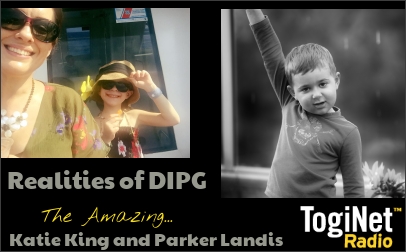
Jaime King, mother to Katie(7), aka Katherine the Brave, and Mark Landis, father to Parker (5), describe the realities faced by parents of DIPG-diagnosed children today. DIPG, diffuse intrinsic pontine glioma, is an invariably terminal pediatric brain tumor with no change in treatment protocol for over 40 years. Parents discover routinely that there are no solutions for their child because, "the numbers aren't great enough for investors." With candid descriptions of the new realities faced after diagnosis, the parents explain how they cope and what they must do to keep going and to understand the meaning of hope. Their voices are a testament for the importance of HRes586, National DIPG Awareness Resolution, advocacy, and change for these children on cancer's literal death-row for kids.
Return to the Childhood Cancer Talk Radio Podcast Page






